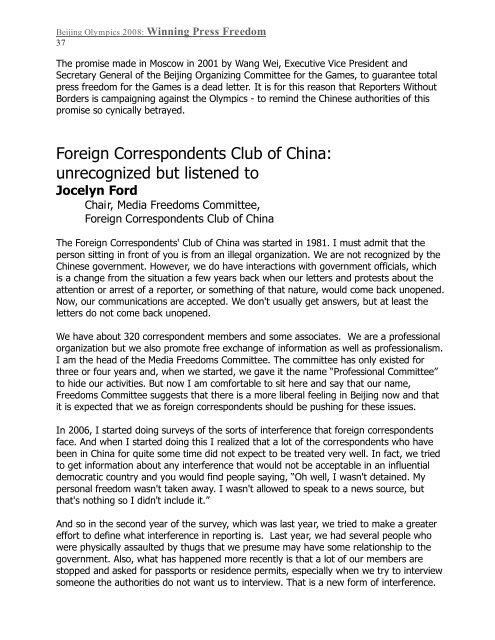Beijing Olympics 2008: Winning Press Freedom - World Press ...
Beijing Olympics 2008: Winning Press Freedom - World Press ...
Beijing Olympics 2008: Winning Press Freedom - World Press ...
You also want an ePaper? Increase the reach of your titles
YUMPU automatically turns print PDFs into web optimized ePapers that Google loves.
<strong>Beijing</strong> <strong>Olympics</strong> <strong>2008</strong>: <strong>Winning</strong> <strong>Press</strong> <strong>Freedom</strong><br />
37<br />
The promise made in Moscow in 2001 by Wang Wei, Executive Vice President and<br />
Secretary General of the <strong>Beijing</strong> Organizing Committee for the Games, to guarantee total<br />
press freedom for the Games is a dead letter. It is for this reason that Reporters Without<br />
Borders is campaigning against the <strong>Olympics</strong> - to remind the Chinese authorities of this<br />
promise so cynically betrayed.<br />
Foreign Correspondents Club of China:<br />
unrecognized but listened to<br />
Jocelyn Ford<br />
Chair, Media <strong>Freedom</strong>s Committee,<br />
Foreign Correspondents Club of China<br />
The Foreign Correspondents' Club of China was started in 1981. I must admit that the<br />
person sitting in front of you is from an illegal organization. We are not recognized by the<br />
Chinese government. However, we do have interactions with government officials, which<br />
is a change from the situation a few years back when our letters and protests about the<br />
attention or arrest of a reporter, or something of that nature, would come back unopened.<br />
Now, our communications are accepted. We don't usually get answers, but at least the<br />
letters do not come back unopened.<br />
We have about 320 correspondent members and some associates. We are a professional<br />
organization but we also promote free exchange of information as well as professionalism.<br />
I am the head of the Media <strong>Freedom</strong>s Committee. The committee has only existed for<br />
three or four years and, when we started, we gave it the name “Professional Committee”<br />
to hide our activities. But now I am comfortable to sit here and say that our name,<br />
<strong>Freedom</strong>s Committee suggests that there is a more liberal feeling in <strong>Beijing</strong> now and that<br />
it is expected that we as foreign correspondents should be pushing for these issues.<br />
In 2006, I started doing surveys of the sorts of interference that foreign correspondents<br />
face. And when I started doing this I realized that a lot of the correspondents who have<br />
been in China for quite some time did not expect to be treated very well. In fact, we tried<br />
to get information about any interference that would not be acceptable in an influential<br />
democratic country and you would find people saying, “Oh well, I wasn't detained. My<br />
personal freedom wasn't taken away. I wasn't allowed to speak to a news source, but<br />
that's nothing so I didn't include it.”<br />
And so in the second year of the survey, which was last year, we tried to make a greater<br />
effort to define what interference in reporting is. Last year, we had several people who<br />
were physically assaulted by thugs that we presume may have some relationship to the<br />
government. Also, what has happened more recently is that a lot of our members are<br />
stopped and asked for passports or residence permits, especially when we try to interview<br />
someone the authorities do not want us to interview. That is a new form of interference.





